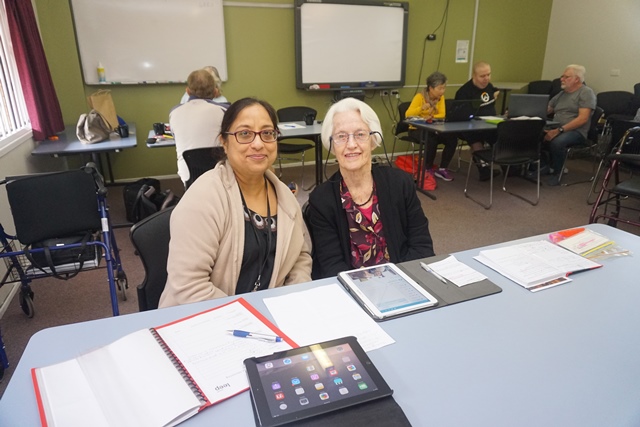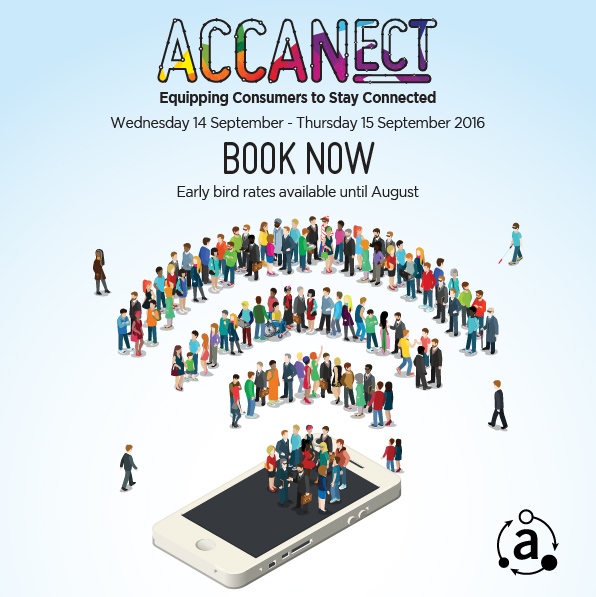Key Dates
Next Grant Round:
Applications for funding will open early 2025.
> Information about our Grants Program
Independent Grants Panel:
Results of the recent EOI will be notified Dec 2024.
> Information about our Panel
We can help: grants@accan.org.au
or phone 02 9288 4000
Subscribe to Grants Program mailings
 If like me you’ve got Teflon-coated hands, then dropping your mobile phone and breaking your screen is a regular occurrence. To avoid expensive repair jobs you might consider taking out insurance. ACCAN’s investigator, Xavier O’Halloran, wades through the legal fine print and uses his abacus to crunch the numbers on three of the major insurance plans.
If like me you’ve got Teflon-coated hands, then dropping your mobile phone and breaking your screen is a regular occurrence. To avoid expensive repair jobs you might consider taking out insurance. ACCAN’s investigator, Xavier O’Halloran, wades through the legal fine print and uses his abacus to crunch the numbers on three of the major insurance plans.
Read more: Should I insure my smartphone?
Write comment (0 Comments)The Regional, Rural and Remote Communications Coalition (RRRCC) today met with members of the National Broadband Network (nbn) executive team, including Chief Executive Officer Bill Morrow, to discuss ways of improving broadband access in rural, regional and remote Australia.
The meeting was instigated by nbn following almost 12 months of extensive activity by the RRRCC to raise awareness of the challenges consumers in rural, regional and remote areas continue to face.
“We appreciate nbn inviting the Coalition to discuss ongoing issues firsthand,” AgForce representative, Georgie Somerset said.
“It is certainly valuable that Bill Morrow and his senior team have taken the time to again meet with us directly and discuss the issues we have.”
Read more: RRRCC takes case for #betterbushcomms to nbn headquarters
Telstra and TPG Telecom (TPGT) have asked for ACCC authorisation to share their separately owned spectrum for the delivery of mobile services in a regional coverage zone. As part of the arrangement, Telstra and TPGT will also consolidate their mobile towers and TPGT will gain access to some of Telstra’s coverage.
Read more: Telstra TPGT Multi-Operator Core Network (MOCN) Agreement
Planning for our 2016 Conference, ACCANect: Equipping Consumers to Stay Connected, is well underway. We’re curating an exciting program (stay tuned for updates!) which will feature some inspirational and key figures in the telecommunications space. You can now register for the Conference. Remember: if you register before 12 August you can take advantage of early bird rates.
This is a busy time of year for everyone, and before we know it, it will be September and we’ll be welcoming you to our 2016 Annual Conference. While we were workshopping ideas and speakers for this year’s Conference, we got a little nostalgic and wanted to share with you some highlights of our past events.
Read more: Highlights from our past Conferences
Write comment (0 Comments)ACCAN’s 2017 National Conference, ACCANect: Your place in the connected world, will focus on consumer issues related to our increased connectivity and the digital world. It’s being held at the Aerial UTS Function Centre in Sydney over the next two days.
“Digital technology has transformed consumer experiences,” said ACCAN CEO, Teresa Corbin. “Consumers can buy products, access information, and communicate with people anywhere in the world with just the touch of a button. This increased connectivity raises some big questions and implications for consumers.
“As we become more and more connected and government services move online, how can we ensure that everyone can get access to the internet? How safe is our personal information? What information is being collected about us from connected devices? These are some of the issues we’ll explore at the Conference,” added Ms Corbin.
The telco regulator, the Australian Communications and Media Authority (ACMA), has recently consulted on proposals to amend the Telecommunications (Listed Infringement Notice Provisions) Declaration 2022 (the IN Declaration). The IN Declaration allows the ACMA to issue infringement notices (fines) when telcos don’t follow certain rules.
Read more: Telecommunications (Listed Infringement Notice Provisions) Declaration 2022
 ACCAN has a broad membership base that represents groups in the community sector, disability sector, small business owners and more.
ACCAN has a broad membership base that represents groups in the community sector, disability sector, small business owners and more.
Our members are invaluable to the work we do as they are often invited to have their say in our submissions and consultations. Not only that, we look to our members to support ACCAN’s work and to let us know of the issues affecting their stakeholders.
Read more: ACCAN members have their say
Write comment (0 Comments)Guaranteed access to broadband services for all Australians is a step closer after a Senate Committee last night recommended the Telecommunications Reform Package be passed by Parliament.
The recommendation was welcomed by the Regional, Rural and Remote Communications Coalition (RRRCC).
“We are pleased the Environment and Communications Legislation Committee has taken this view,” National Farmers’ Federation President, Fiona Simson said.
“In effect, this new obligation will, for the first time, legally ensure all Australians have access to broadband.
The Australian Communications Consumer Action Network (ACCAN) recently submitted to the Department of Home Affairs’ National Security Action Plan Discussion Paper. As the leading voice for communications consumers in Australia, ACCAN continues to monitor a range of data rights and privacy issues. ACCAN responded to questions 14 and 15 in the discussion paper which inquired about how to foster consumer trust in data security.
Question 14 in the discussion paper asked whether there is sufficient public information about data security. ACCAN noted that government data security information for consumers is spread across several websites and recommended the Federal Government further invest in quality, accessible education resources to be housed in a single, well-publicised location.
 We interviewed the new Telecommunications Industry Ombudsman (TIO), Judi Jones, for our Winter Magazine to find out more about her past work experience and the future direction of the TIO.
We interviewed the new Telecommunications Industry Ombudsman (TIO), Judi Jones, for our Winter Magazine to find out more about her past work experience and the future direction of the TIO.
Read more: Our interview with the new TIO, Judi Jones
Write comment (0 Comments)ACCAN welcomes Telstra’s announcement that it will no longer offer third party mobile subscriptions to its customers from 3 December, 2017. Our recent survey found that as many as 1.9m consumers across Australia have found unexpected third party charges on their phone bills in the previous six months.
“We congratulate Telstra on stepping up and taking action to stop their customers from getting slugged by unwanted third party subscriptions,” said ACCAN CEO, Teresa Corbin. “Consumers have had to put up with these unexpected charges far too long.”
While this is a welcome move, ACCAN is calling for stricter regulation on third party billing because so many consumers are getting caught out (see below for additional safeguards we are calling for).
Read more: Telstra customers at reduced risk of unexpected third party charges
Communications Alliance, the peak body for the telco industry, has sought feedback on a new draft Number Management – Use of Numbers by Customers Code. This draft Code replaces two former Industry Codes, that of C566:2005 Rights of Use of Numbers Code and C554:2004 Rights of Use of Premium Rate Service Numbers Code.
 You’re invited to attend our 2016 National Conference - ACCANect: Equipping Consumers to Stay Connected. Registrations are now officially open.
You’re invited to attend our 2016 National Conference - ACCANect: Equipping Consumers to Stay Connected. Registrations are now officially open.
The ACCANect Conference will be held in Sydney on 14-15 September, 2016. Register before 12th August to take advantage of early bird pricing.
Read more: You can now register for the 2016 ACCAN Conference
Write comment (0 Comments)ACCAN welcomes the ACCC’s guidance to retail service providers (RSPs) on broadband speed claims released today. The guidance should help clear up the consumer confusion around broadband speeds. The informative labels that the ACCC has suggested (basic evening speed, standard evening speed, standard plus evening speed and premium evening speed) will help consumers better understand the speeds they can expect from their services, and provide a useful guide on what level of service performance they are buying.
“At the moment consumers are unable to tell what speed they can expect from a service during busy periods,” said ACCAN CEO, Teresa Corbin. “The ACCC’s advice to RSPs to focus their marketing on speed performance during busy periods will help consumers to know what speeds their services will actually deliver during peak times.
Local number portability allows consumers to transfer – or ‘port’ – their local landline telephone number to a new service with a different telco provider.
The Local Number Portability Code (the Code) outlines the procedures that telcos must follow in relation to local number porting. It is important that the Code is thorough and fair so that consumers do not lose their local number in the process, or face lengthy delays when switching telco providers.
Read more: ACCAN feedback on revised Local Number Portability Code
 We’re pleased to announce the successful Grants for 2016. This year the projects look at a range of communications consumer issues including the ballooning market of mental health apps, the security implications of smart home Internet of Things devices, and ways to assist victims of identity theft.
We’re pleased to announce the successful Grants for 2016. This year the projects look at a range of communications consumer issues including the ballooning market of mental health apps, the security implications of smart home Internet of Things devices, and ways to assist victims of identity theft.
The ACCAN Grants Scheme funds projects which undertake research on telecommunications issues, represent consumers or create educational tools which empower consumers to derive the greatest benefit from telecommunications products and services.
Read more: Introducing the 2016 ACCAN Grants projects
Write comment (0 Comments)A new survey, commissioned by the Australian Communications Consumer Action Network (ACCAN), has revealed that 12 per cent of respondents experienced unexpected third party charges on their mobile phone bills in the last six months.
“Applied to the mobile customer base of Telstra, Optus and Vodafone, this 12 per cent equates to almost 1.9m people who could have received unexpected charges on their mobile bills. We estimate that collectively, consumers may have been charged as much as $20m unexpectedly in the last six months*,”said ACCAN Director of Policy, Una Lawrence. “ACCAN is calling for better protections to be put in place so that consumers don’t get caught out with unexpected charges on their mobile bills.”
The ACCAN survey found people are buying apps, games, entering competitions, getting news updates and voting on TV shows and charging it to their mobile accounts. While this may suit some consumers, just under 50 per cent of respondents were unaware their phone could be used this way. Over a third who had incurred unexpected charges reported that they weren’t informed, didn’t consent to or confirm the charge, or understand how or how much they would be charged.
Read more: Unexpected mobile charges may be costing consumers millions
ACCAN recently submitted to The Treasury’s Statutory Review of the Consumer Data Right (CDR) Issues paper. The review, conducted by Elizabeth Kelly PSM, considers whether the existing statutory framework of the CDR is fit-for-purpose. As the peak body that represents all consumers on communications issues, ACCAN has engaged with the development of the CDR, especially as it relates to the telecommunications sector.
 Telecommunication services have and are rapidly evolving. ACCAN believes the enhancements to quality of life and economic opportunities from being connected should be available to all consumers.
Telecommunication services have and are rapidly evolving. ACCAN believes the enhancements to quality of life and economic opportunities from being connected should be available to all consumers.
In looking at the future of communication services in Australia it is time for a new focus on consumer needs. The focus to date has centred too much on developments in the telecommunications market and infrastructure rollout. A consumer focus reveals a number of policy gaps that must be addressed now. These are discussed in ACCAN’s new policy position, The Connected Consumer.
Read more: The future of consumer focused communication services
Write comment (0 Comments)The Government’s commitment to providing the National Relay Service (NRS) into the future is welcomed, however, ACCAN is concerned about the lack of provision to increase funding even though new relay options were introduced over the last three years.
“The NRS has been a critical communications channel for Australians who are Deaf, hearing-impaired or speech-impaired for more than two decades and it continues to be an essential service for many consumers,” said ACCAN Disability Policy Advisor, Wayne Hawkins.
“The introduction of video relay, SMS relay, two-way internet relay, the NRS app and captioned telephony has made Australia’s National Relay Service a worlds-best service for people who are Deaf, hearing-impaired or speech-impaired and it should be applauded.
Read more: ACCAN voices concerns about proposed changes to the NRS
The ACMA has sought comment on Draft Captioning Reduction orders numbers 00132-00137 inclusive. Whilst ACCAN is mindful of the goal of reaching 100 percent of captioning on subscription television services by 2032 as defined in the Broadcast Services Act, as the mentioned services are specifically racing services, a lot of information is already printed on screen and ACCAN does not see significant detriment to consumers by these orders being granted.
 It’s a sad fact of life that one day we will die.
It’s a sad fact of life that one day we will die.
Many of us think of our legacy simply in terms of money in the bank, superannuation, cars, homes and other physical assets, but with more and more of our lives being lived online we have a large digital footprint we could leave behind as well.
Read more: Managing your digital legacy
Write comment (0 Comments)The Telecommunications Reform Package legislation, introduced to Parliament today, includes a guarantee for all premises to access broadband services.
National Farmers’ Federation Chief Executive, Tony Mahar said the legislation was a win for the Regional, Rural and Remote Communications Coalition and the consumers it represented.
"This is a significant first step to ensuring all premises across the country have access to broadband services, capable of at least 25Mbps per second download and 5Mbps upload speeds."
Mr Mahar said the Coalition was glad to see other improvements to the Bill, which aim to stop the handballing of complaints between network and internet providers and to get complaints addressed more quickly.
"The bill also allows regional services to be funded sustainably and transparently into the future with the Regional Broadband Scheme.
Read more: Broadband wins for regional consumers but reliable telephone services remain a concern
ACCAN recently submitted to the Communications Alliance review of Industry Code C525:2017, regarding the Handling of Life Threatening or Unwelcome Communications.
After consulting with member organisations, ACCAN is not aware of any issues affecting consumers in relation to this Code, and as such, has recommended this Code continue unchanged.
Read more: The Handling of Life Threatening or Unwelcome Communications

